May 19, 2025 | 20:51 GMT +7
May 19, 2025 | 20:51 GMT +7
Hotline: 0913.378.918
May 19, 2025 | 20:51 GMT +7
Hotline: 0913.378.918
At the end of this November, Cau Dat Bean Coffee Company (Da Lat City, Lam Dong province) is organizing the harvest of organic coffee on a 30-hectare area for processing and meeting export orders. In order to ensure quality and enhance the value of the product, the company consistently communicates to the affiliated farmers the necessity of implementing a selective harvesting process, ensuring that 100% of the coffee cherries are fully ripe.
According to Mr. Bui Xuan Thang, the process of harvesting 100% ripe coffee cherries brings numerous benefits. Specifically, products made from properly ripened coffee cherries yield high-quality results with a delightful aroma. The acidity and bitterness in the product are reduced to the minimum level. Additionally, producers benefit from higher yields of fresh coffee, resulting in better prices compared to underripe coffee.
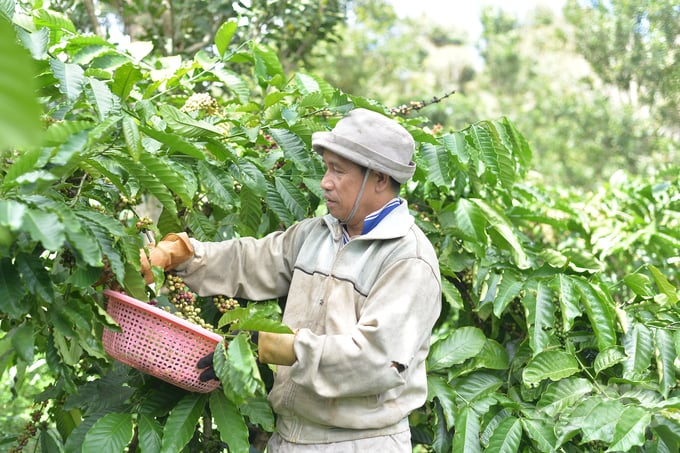
Mr. Trinh Tan Vinh's family (Di Linh district, Lam Dong) organizes selective coffee harvesting. Photo: Minh Hau.
Thang further explains that the company primarily caters to the export demands of discerning markets such as the EU, the United States, Japan, South Korea, exporting approximately 180 tons of green beans annually, with plans to increase the quantity in the future. Therefore, the selective harvesting process is crucial to improving quality and meeting the requirements of partners.
Similarly, the Hoa Linh Coffee Cooperative (Di Linh district, Lam Dong province) is entering the stage of pruning and caring for the coffee plants in preparation for the harvest. Mr. Tran Mai Binh, the Director of the Hoa Linh Coffee Cooperative, states that many orchards within the cooperative have ripe fruits, and the cooperative encourages its member households to organize selective harvesting. Although this harvesting method requires more effort and differs from traditional practices, it is essential to enhance the quality of the product.
According to Tran Mai Binh, in the past, coffee growers often adhered to the belief that "green at home is better than ripe in the field," leading to a general harvest when the coffee reached a ripeness ratio of under 70%. This practice, however, resulted in a decrease in both the quality and quantity of coffee beans.
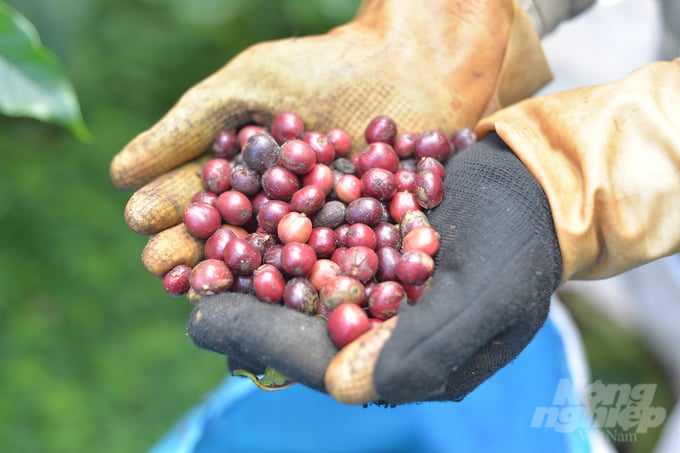
Currently, many businesses and cooperatives in Lam Dong are committed to purchasing selectively harvested coffee at prices higher than the market price. Photo: Minh Hau.
Comparing the benefits of harvesting 100% ripe coffee for processing with the practice of harvesting green coffee, Mr. Trịnh Tấn Vinh, the Director of Thuan Trinh Cafe Company (Di Linh district), explains that beans processed from green harvesting are often uneven, dark, with small-sized beans and an unattractive appearance. On the other hand, fully ripe cherries produce larger, shinier, and more aesthetically pleasing beans.
Mr. Trinh Tan Vinh further emphasizes that his family focuses on producing high-quality products, regularly monitoring and evaluating the products. Specifically, his family uses a formula to compare the difference in weight between the beans and the fresh cherries. According to their findings, 1kg of fresh coffee with approximately 1,113 cherries, when processed, yields 220 grams of beans. In contrast, 1kg of fully ripe coffee, with around 833 cherries, produces 260 grams of beans after processing. Adhering to organic production processes and ensuring selective harvesting for processing, Mr. Vinh's family has secured supply contracts from partners at prices ranging from 200,000 to 500,000 VND/kg.
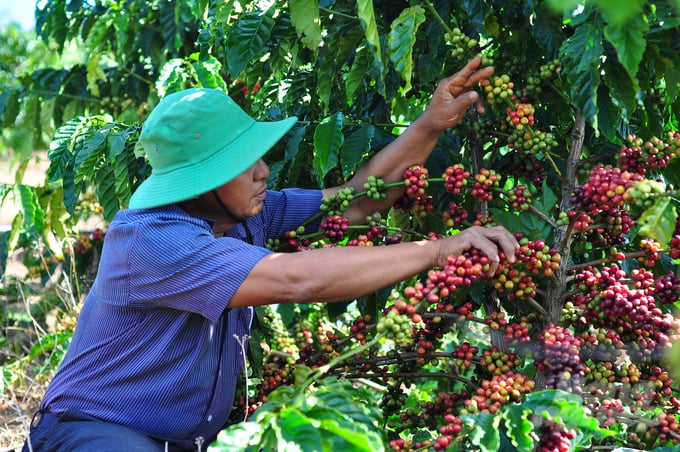
The agricultural sector of Lam Dong province recommends that people harvest ripe coffee to ensure quality. Photo: Minh Hau.
In assessing the impact of green coffee harvesting, Mr. Doan Mang Trinh, Deputy Director of Tam Trinh Coffee Import-Export Company (Lam Dong province), indicates that the processing of green coffee results in poor-quality products and significant weight loss. Specifically, if harvesting is done when the ripeness ratio is 40% ripe and 60% green, the weight loss is approximately 20%. In the case of a ripeness ratio of 70% ripe and 30% green, the loss ratio is also around 15%. Mr. Trình further notes that Lam Ha district has approximately 40 thousand hectares of coffee, with a total output exceeding 150 thousand tons. Therefore, considering a 15% loss rate, the district stands to lose over 20 thousand tons per crop.
Mr. Mai Ngoc Dinh, in charge of sustainable coffee production at Tam Trinh Coffee Import-Export Company, mentions that the company is currently establishing a chain with 3,000 high-quality coffee-producing farmers for export to Europe, the United States, Japan, the Philippines, etc., exporting around 40 thousand tons annually. To ensure quality, the company regularly organizes training sessions on ripe harvesting techniques and modern production processes for the local population. Particularly, it disseminates knowledge regarding the The European Union Deforestation Regulation (EUDR).
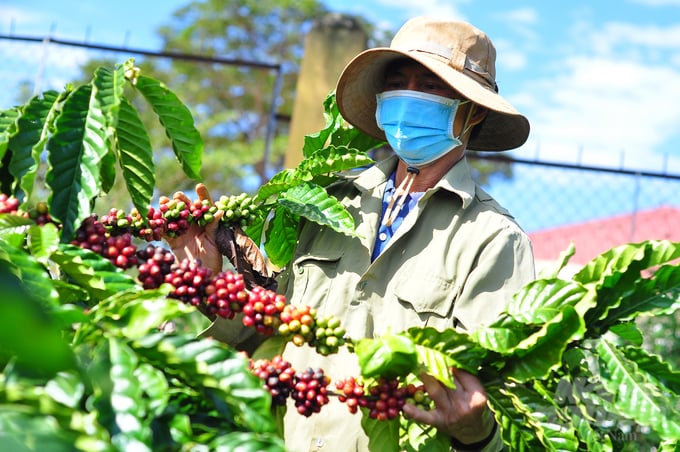
Lam Dong's coffee output is about 600 thousand tons/year. Photo: Minh Hau.
As a result, the agricultural sector advises the public to harvest only ripe coffee, avoiding the harvesting of green or unripe fruits. Harvesting must adhere to proper techniques, avoiding squeezing, pulling, or breaking branches. Harvesting should be carried out multiple times in a crop season to ensure harvesting of all ripe fruits, and harvesting must cease 3 to 5 days before and after flowering.
In conjunction, the provincial agricultural sector of Lam Dong also advises the public to transport harvested coffee promptly to processing locations. Fresh coffee should not be stored for wet processing for more than 12 hours, and dry processing should not exceed 24 hours. Additionally, appropriate processing methods for each coffee variety must be applied, ensuring the quality requirements of the product. Coffee cherries, parchment coffee, and green beans, after exposure and drying to achieve a moisture content of 12-13%, must be stored in specialized bags and kept in clean, dry, well-ventilated warehouses.
According to the Lam Dong Department of Agriculture and Rural Development, the local coffee production exceeds 600 thousand tons per year. The province's green coffee beans and roasted ground coffee products are exported to familiar markets in Europe, such as Germany, Spain, Belgium, Italy, as well as Asian markets like Taiwan, South Korea, Japan, Indonesia, etc. In 2022, the province exported over 90 thousand tons of green coffee beans, with a value exceeding USD 180 million. Given that coffee is one of the province's key crops, Lam Dong is actively developing sustainable models. The local agricultural sector encourages individuals and businesses to cultivate specialty coffee, high-quality coffee, and to organize ripe harvesting to enhance both quality and value. The province collaborates with relevant agencies, units, and businesses to disseminate information and new regulations regarding EUDR for effective production organization.
Translated by Linh Linh
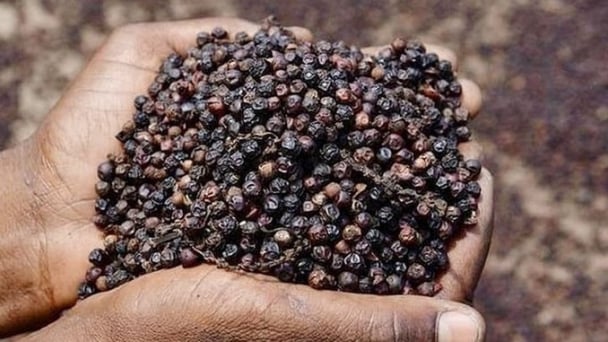
(VAN) Pepper prices on May 16, 2025, fluctuated by VND 500–1,000 domestically, trading at VND 151,000 – 152,000/kg. Global pepper prices remained stable.

(VAN) Coffee prices on May 16, 2025, edged up by VND 200, trading around VND 125,900 – 126,200/kg. Meanwhile, global coffee prices are showing mixed movements.

(VAN) Live pig prices on May 16, 2025, continue to remain flat. Live pig prices across the 3 regions are trading in the range of VND 67,000 to VND 75,000/kg.
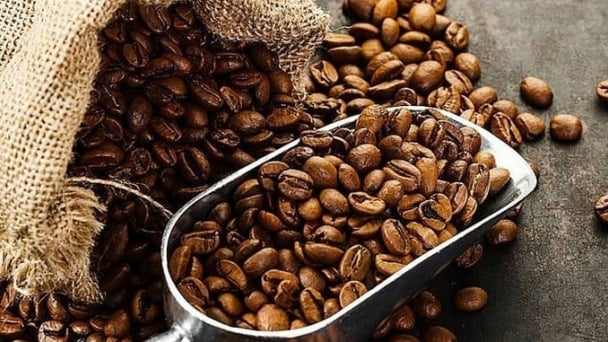
(VAN) Coffee prices on May 15, 2025, fell sharply by VND 2,500, trading at VND 125,700 – 126,200/kg. Global coffee prices also dropped significantly by 3%.
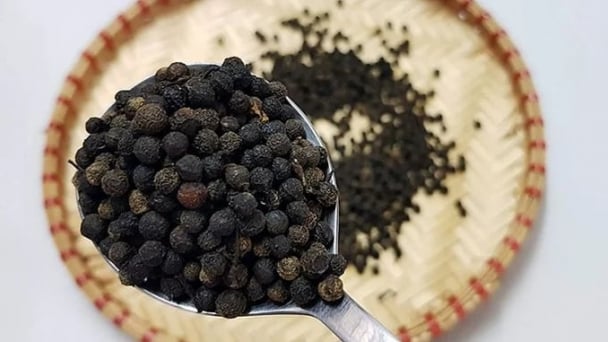
(VAN) Pepper prices on May 15, 2025, remain unchanged domestically, trading at VND 151,000 – 152,000/kg. Meanwhile, global pepper prices show mixed movements.
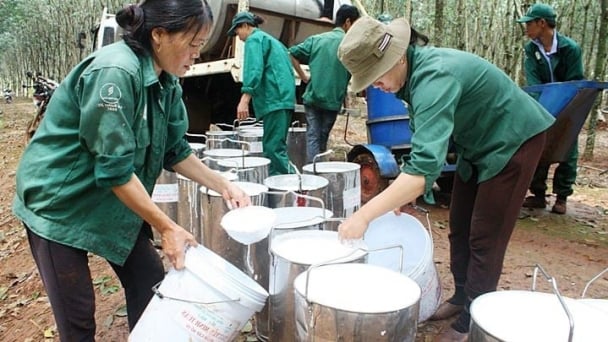
(VAN) Rubber prices on May 15, 2025, rise across global markets. Meanwhile, domestic latex prices remain steady, ranging from VND 397 to VND 462/TSC.

(VAN) Coffee prices on May 13, 2025 decreased by VND 1,200, trading around VND 125,500 – 126,000/kg. Global coffee prices also fell sharply.